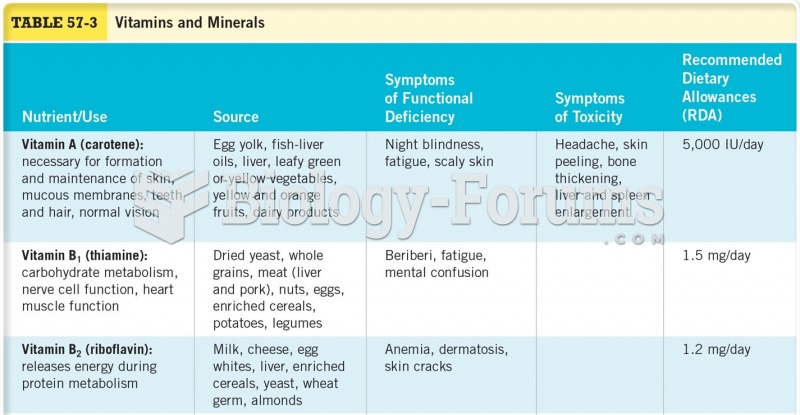Answer to Question 1Fat-soluble vitamins include A, D, E, and K.
Water-soluble vitamins include C and the B-complex vitamins.
Vitamin A is associated with good vision, respiration, digestion, and reproduction.
Vitamin D is associated with calcium and phosphorus in the body.
Vitamin E is important for successful reproduction.
Vitamin K is necessary for maintenance of normal blood coagulation.
Vitamin C, or ascorbic acid, is synthesized by most animals and is not a consideration in feeding rations.
Guinea pigs and primates must receive dietary vitamin C to prevent scurvy.
Vitamin B1, or thiamine, is necessary for normal metabolism of carbohydrates. It is needed to prevent a
deficiency disease called polyneuritis or beri-beri.
Vitamin B2, or riboflavin, is necessary for normal bone development.
Niacin is necessary for digestion and growth.
Pantothenic acid is necessary for proper growth and nerve development.
Vitamin B12, or cyanocobalamin, is necessary for normal growth, reproduction, and blood formation.
Choline functions in the transportation and metabolism of fatty acids.
Folic acid, or folacin, is required for normal cell development and is essential in certain biochemical reactions.
Biotin is important in carbohydrate and fat metabolism.
Vitamin B6, or pyridoxine, helps build proteins and is essential in the metabolism of carbohydrates.
Answer to Question 2Water is in every cell of the animal and is necessary for the following:
(a) supporting biochemical reactions in the body, including respiration, digestion, and assimilation
(b) transporting other nutrients
(c) helping maintain body temperature
(d) helping to give the body its form
(e) carrying waste from the body
Proteins are needed for the following:
(a) developing and repairing body organs and tissues, such as muscles, nerves, skin, hair, hooves, and feathers
(b) producing milk, wool, and eggs
(c) developing the fetus
(d) building material for enzymes and hormones
(e) developing antibodies
(f) transmitting DNA
Carbohydrates supply energy needed for the following:
(a) supporting bodily functions, such as breathing, digestion, and exercising
(b) producing heat to keep the body warm
(c) storing fat
Fats are essential in the diet for the following:
(a) providing energy
(b) aiding in the absorption of fat-soluble vitamins
(c) providing fatty acids
Vitamins are necessary for specific biochemical reactions such as the following:
(a) regulating digestion, absorption, and metabolism
(b) developing normal vision, bone, and such external body coverings as hair and feathers
(c) regulating body glands
(d) forming new cells
(e) fighting disease and strengthening the immune system
(f) developing and maintaining the nervous system
Minerals are primarily needed to supply the materials for building the skeleton and producing body
regulators such as enzymes and hormones.







